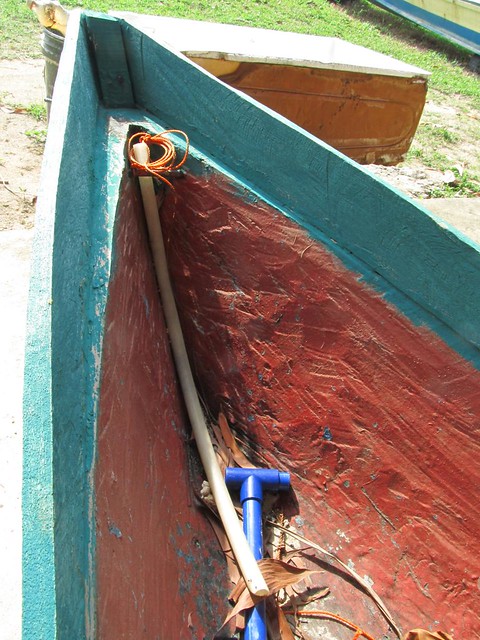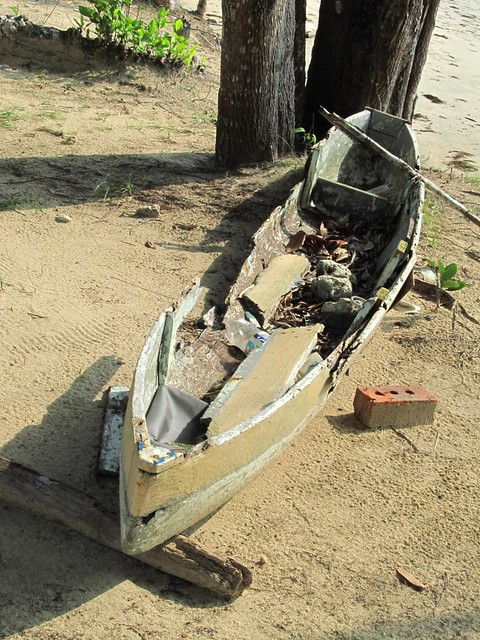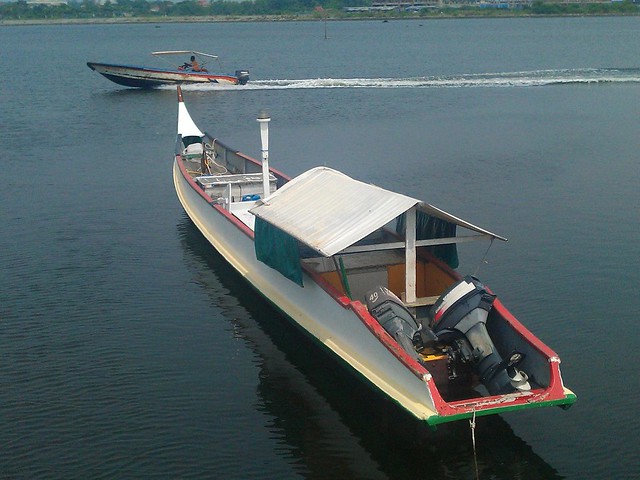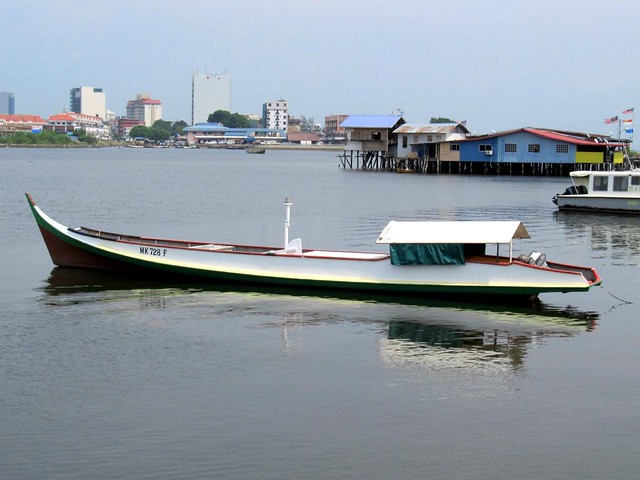Well, we all have our expectations … I came to the Philippines for the first time last year – to find an amazing array of indigenous boats – every bay and every village has a different style of boatbuilding.
I was there initially as it is a great hub for cheap flights throughout Asia – so my plan was based on that premise. Now, I was here on an off for a six month period.
I met with the local Pinoyboats.org group who were tremendously motivated and interested in building wooden boats and productive at it … Wharram Catamarans, B and B ketch dinghies, OzRacers, PDRacers, catamarans, motor boats, skiboats, a daysailing trimaran made of coconut lumber and carbon fibre (a very cool looking beast) and even a Goat Island Skiff.

They are much like other groups that meet on the internet in other countries. I recommend you look at their website and very active forum and attend their regular events.
We ended up doing a huge number of projects together. Including the amazing Oz Goose group builds now numbering over 100 boats and part of the official racing scene in the Philippines.
One of the first places I jumped to on a $40 Cebu Pacific Air discount fare was Kota Kinabalu in the state of Sabah. It is KK to the mainland’s KL – it is on the island of Borneo.

Kota kinabalu is the 7th largest city in Malaysia. It is much newer, more planned out and seems to have cracked the problems of other places. Different groups of people manage to get along with little stress. You can see mixed groups walking on the streets in the evening. Mix of Malay, Kadazan-Dusan (original inhabitants), Indian background, Chinese background. And a mix of religions – Catholicism, Islam, other christian denominations, Buddhism, Taoism and much much more.

One of my friends there said that part of the reason is that all the kids spend time together. They go to the same schools are invited to each other’s birthdays, sleepovers – all the normal kid stuff. Everyone is aware of each other’s food requirements so take care to be inclusive. My best friend there is from the Kadazan people, is catholic, follows all the chinese holidays and feast days, speaks perfect English, Kadazan and Mandarin.

As far as food goes it is an irresistible melting pot of Malay style coconut curries, steamed buns, seafood to die for, roti chennai, Sambals, Roast Lamb with mint sauce and Masala Dosa. And I’m totally understating it – and there is plenty of vegetarian food too – phew! Ask the locals what they miss when they travel … FOOD!

So … boats … this is a Maritime city. The British claimed a base there sometime in the late 1800s. In typical fashion they renamed the village Api Api to Jesselton after the boss guy. It was chosen because of its strategic access to the Malaysian, Indonesian and Philippines archipelagos.

Sabah itself shares a land border with the Philippines and perhaps the fairest way to describe it is that there was a mixing of peoples from Sabah and the Philippines over centuries.
OK … lets get to the boats. The best way to introduce them is to show you one of my many walks around the town .. my favourite thing to do when travelling alone. Which is much of the time – I really like being away from hubbub in English – getting lost in exotic syllables. A small part of the waterfront …

A wonderful little launch

Variety of utility boats

I found out that, on the edges of a new riverside development/gentrification there was a Filipino barangay. And the previous day I had seen a number of boats briefly as I shot above on an overpass. The houses are on stilts in what would have been a swampy area but my eyes were on the boats.

Boats are my thing and I was pretty keen to see what had been done and offer my opinions … maybe even give a pointer or two.
First I walked along the foreshore … there was a hut on piles in the river with boats moored around. I could see about 15 local men inside and a new looking boat in the middle … so I walked up.

The story was the boat is a new raceboat – and my idea of offering pointers just vanished when I saw the sophistication of the construction.
It is simple nail and glue but the hullshape is complex. Clearly, the locals well understand using the plywood to absorb the loads and that the timber is there to hold the plywood together. Filipino Boatbuilding in Malaysia!

Plywood was 5mm Light timber scantlings
One really neat feature is how the bottom ply was joined – a series of steps on the bottom. It is not enough of a step to be a really stepped bottom. But, a really neat construction solution. This is an example on another boat.

The other men pointed out the builder and called him the “builder guru”

I asked about power and they pointed to a Briggs and Stratton air cooled motor and introduced me to another man – the “Engine Guru”. Apparently he gets about 28hp by modding a stock motor. I think the base horsepower was 12, but it might have been 18. He was shy and didn’t want to be photographed.

You sometimes hear one of these go past – they howl like a wild thing.
The boat has a life after racing. They are used as ferries for paying passengers. The rudder is a simple push pull – often with a hinge so that it can be swung out of the water for net fishing. The prop is taken off too when netting


Walking along the shore there was a bewildering array of different hull styles including this neat Dory powerboat. Internationalism in boat design but I am not sure if it was an example of Filipino boatbuilding.

A cut down dragon boat type shape used (probably briefly :) ) as a powerboat.

A piece of sculpture

You can see the structures from the boats being repaired or abandoned. But alive or dead the boats hint at the diversity of approaches and the experimental ethos of Filipinos. A creative, can-do, make do with what you have culture.

I was humbled.
A few weeks later I went to Labuan Island – three hours by ferry away. Another former British colony and a place lots of Australians saw action in WW2. It is now one of the hubs of oil production for Malaysia (and the best Mee Goreng I’ve had for years).
Most of the boats I saw on a driving circumnavigation were a variety of outrigger canoes of about the same size. Construction was radically different from boat to boat, ranging from dugouts to plywood, timber planked and other materials.



There was one beside this next that had its bow propped up so that water wouldn’t pool in the bottom :)


Additionally there are other rather nice utility boats for outboard power.

Also fast little ferry boats – I really dig the styling – like the hottest modern production powerboats .. .but all plywood!
There are Filipino communities too carrying out modern Filipino boatbuilding methods using plywood.


But something else too. It was in a Filipino area, but I saw a bigger ice carrying one heading out to the island resorts from KK. Hints of Paraw, but devoted to motor boat design.

This was inside another Filipino area on the Island – mostly people who had been in Malaysia for a generation or two. So were much more established and part of the general community.

Note the two outboards of differing vintages. I would be guessing that it starts off with a single outboard. Ten as the family makes more money they get a second outboard … just a guess … or it could just be luck of the draw.

Here is the bigger ice carrying boat, though they used the size above for the same job.

Another shot … that’s not a sleek production fibreglass boat beside it – it is a homemade plywood boat by Filipinos

Sliding ice down the gangplank

I don’t know if these boats are more Malaysian or more Filipino or have some input from other regions.
All in All I was totally boggled by the range of boat types and the sophistication of design and methods.
And not knowing what to do about the dozens more photos I took … we say farewell to Kota Kinabalu and its communities from the region – a picture postcard finish to go with the picture postcard prose.

To return another day
More about Filipino Boatbuilding
We are far more interested in boatbuilding in wood.
See how the Philippine Home Boatbuilding Yacht Club Group (a nonprofit) are bringing sailing back to the Filipino people with their Oz Goose Family Boatbuilding Weeked project.
See the SAIL PH OZ Goose Site for more info

The project has a cost of around 55K per boat that has brought sailing to more than 100 families and community groups all around the Philippines.
Over 100 boats built by 2021.

More Filipino boats in my article about Pagsanjan Waterfall trip.